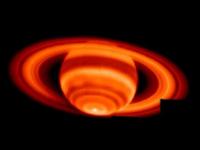







|
News and Information
Hot shot of Saturn's 'hot spot'
| February 7, 2005 |

Saturn is just past its southern summer solstice
Enlarge Image
Infrared images of Saturn's atmosphere, taken by the Keck observatory, show the planet's "hot spot" at the south pole.
The pictures reveal how temperatures on the planet take a sudden jump, from about 30 degrees south, with another sharp rise at the very tip of the pole.
In Earth's atmosphere, polar vortices would usually trap cold air.
On Saturn, US space agency (Nasa) scientists think vortices may constrain particles warmed by the Sun in the stratosphere and high troposphere.
"There is nothing like this compact warm 'cap' in the Earth's atmosphere," said Dr Glenn Orton, senior research scientist at Nasa's Jet Propulsion Laboratory in Pasadena, California.
"Meteorologists have detected sudden warming of the pole, but on Earth this effect is very short-term.
"This phenomenon on Saturn is longer-lived because we've been seeing hints of it in our data for at least two years."
It also represents the first case of a warm polar cap ever detected in the Solar System.
Saturn's southern pole should be warmer currently because it has been exposed to 15 years of continuous sunlight, having just reached its summer Solstice late in 2002.
But the discrete boundaries where temperatures suddenly jump are a surprise for scientists.
The tropospheric temperature increases toward the pole abruptly near 70 degrees latitude from 88 to 89 Kelvin (-185 to -184 Celsius) and then to 91K (-182C) right at the pole.
Near 70 degrees latitude, the stratospheric temperature increases even more abruptly from 146 to 150K (-127 to -123C) and then again to 151K (-122C) right at the pole.
"The abrupt temperature changes may be caused by a concentration of sunlight-absorbing particulates trapping heat in Saturn's upper atmosphere," Nasa said.
But the precise mechanisms involved remain a mystery, it added; although the Cassini spacecraft now in orbit around Saturn may be able to explain them in the future.
Orton and colleagues report their findings in the journal Science. |
Source: www.bbc.com |
| http://news.bbc.co.uk/2/hi/science/nature/4244017.stm |
|
| Support Caprivi Freedom |
Fill out the form below to become a member of this site and receive our regular newsletter.
|

|

